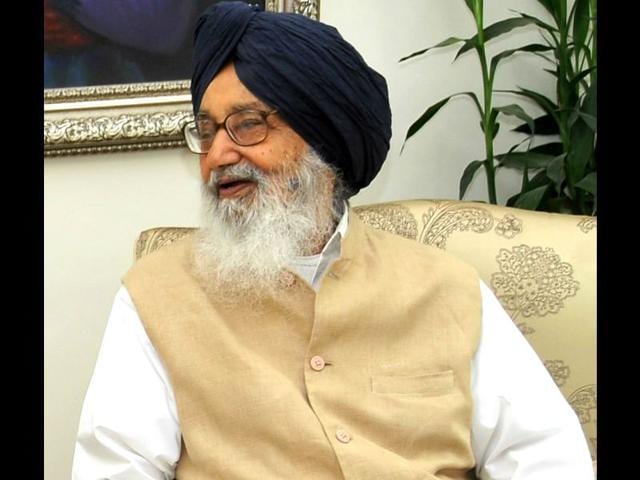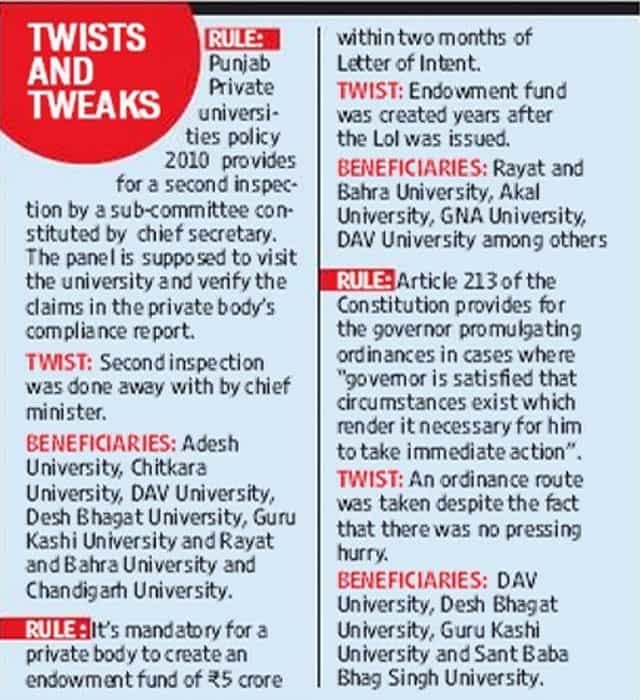Private universities of Punjab: Bend it like Badal
Even as the Punjab assembly meets on Monday to consider the creation of yet another private university in the state, a Hindustan Times investigation based on documents procured under the Right to Information Act has revealed that the government has in the past five years created 11 universities, brazenly flouting the rule book, overlooking glaring deficiencies and rushing them through an ordinance route and flawed Acts.
Even as the Punjab assembly meets on Monday to consider the creation of yet another private university in the state, a Hindustan Times investigation based on documents procured under the Right to Information Act has revealed that the government has in the past five years created 11 universities, brazenly flouting the rule book, overlooking glaring deficiencies and rushing them through an ordinance route and flawed Acts.

After the creation of Lovely Professional University near Jalandhar in 2005 and the Sri Guru Granth Sahib World University, Fatehgarh Sahib, in 2008, the state government brought out the Punjab Private Universities Policy in June 2010 that laid down the rules to be followed for the creation of such universities. Eleven universities have been created under these rules since then, averaging at two universities a year.
According to rules, following the initial scrutiny and first physical inspection of the proposed university site, a high-powered committee headed by the chief secretary issues the private body a letter of intent (LoI), listing out the conditions the private body must meet within two to three years of the date of issue of the LoI. Once the private body submits the compliance report, its claims are to be cross-checked by the government during a second physical inspection of the proposed univesity site. Only after the second inspection, can a final nod be given for the creation of the university.
However, in the case of seven out of the 11 universities, the government did not carry out the second physical inspection. As a result, these universities have come about virtually on the basis of “self-certification” and inhouse claims. The second inspection comes at the stage just before the creation of the university and is the last time a government authority can access the institutions before it becomes an island of autonomous functioning.
A scrutiny of the notings and correspondence files on the creation of these universities reveals that in all these cases the private bodies setting up the universities were given exemption from the vital second inspection by chief minister Parkash Singh Badal following suggestions forwarded by the department.

Ordinance route
In many cases, these universities were created taking the ordinance route without adequate justification for the undue haste shown. In at least two cases—Sant Baba Bhag Singh University and Chandigarh University Gharuan the Punjab governor – to whom the ordinance was sent for promulgation – refused to allow the government to bypass the legislative process. However the government had its way in the case of Sant Baba Bhag Singh university and an ordinance was promulgated barely a week before it was converted into an Act and placed before the Assembly.
From many files, it is evident that some universities have been created despite glaring deficiencies, sometimes in terms of the total land requirement, change of land use requirement or approved building plans. For instance, in the creation of the Akal University, even the requirement of 10 years experience of having run a higher education institution was relaxed. The Kalgidhar Society, which created the university, had been running a music school since 1990 at Baru Sahib, Sirmaur, and according to the Punjab government this was proof enough to allow the society to run a university.
Objections overruled
In other cases, objections raised by experts and officers on files against the creation of certain universities were ignored with no reasons given. Adesh University was approved despite a vehement objection raised in writing by Dr SS Gill, the then vice-chancellor of Baba Farid University of Medical Sciences, Faridkot vide his letter dated 27.2.2011.
In at least three cases, the Acts passed by the assembly were different from those printed and notified. In December 2012, a change in some clauses of the DAV University Bill was made at the last minute by then education minister Sikander Singh Maluka. However, when the final act was printed, the original provisions were still in place. The same “mistake” was done in the case of Rayat and Bahra University as well in 2014 when instead of printing the Act passed by the assembly, an older version of the bill was printed. While no action was taken against any one for the faux pas, nothing was done subsequently to set the record straight even when the mistake was taken note of.
On September 1, new principal secretary higher education A Venuprasad wrote a demi-official letter to the legal remembrancer to amend these Acts accordingly and get the correct ones printed.
No regulatory authority
Some universities did not set up an endowment fund worth `5 crore within two months of the issuance of the LOI. The department also made little effort to ensure that the endowment fund is set up. In these cases, the endowment fund was set up years after the LoI was issued. Whether this caused any financial loss of the state exchequer is not certain.
Some years ago, the CM insisted that every private university under consideration should be asked to set up an institution where students of classes 11 and 12 are taught. At least 50 students of economically weaker sections were to be taught free of cost. While a majority of private bodies gave an undertaking that this new condition would be met, the department has no authority to check if this condition has been implemented or not.
The state policy lays down no rules empowering the government to regulate or monitor the private universities thus created after they are enacted. Following criticism from the Opposition and also some ruling party MLAs, deputy CM Sukhbir Badal had announced on the floor of the House in December 2014 that the government will come up with a regulatory authority for private universities.





